Today we are taking a look at the PNY CS2130 1TB SSD. PNY is targeting the CS2130 line as a mainstream level PCIe 3.0 drive designed as an upgrade to a SATA SSD or spinning HDD. Our 1TB test model is based on the Phison PS5012-E12S controller and comes equipped with Micron QLC NAND. QLC is more typically the domain of entry-level drives, so pay attention to our benchmarks to see how it fares for the CS2130.
PNY CS2130 1TB NVMe SSD
The PNY CS2130 1TB comes in a single-sided M.2 2280 (80mm) form factor.
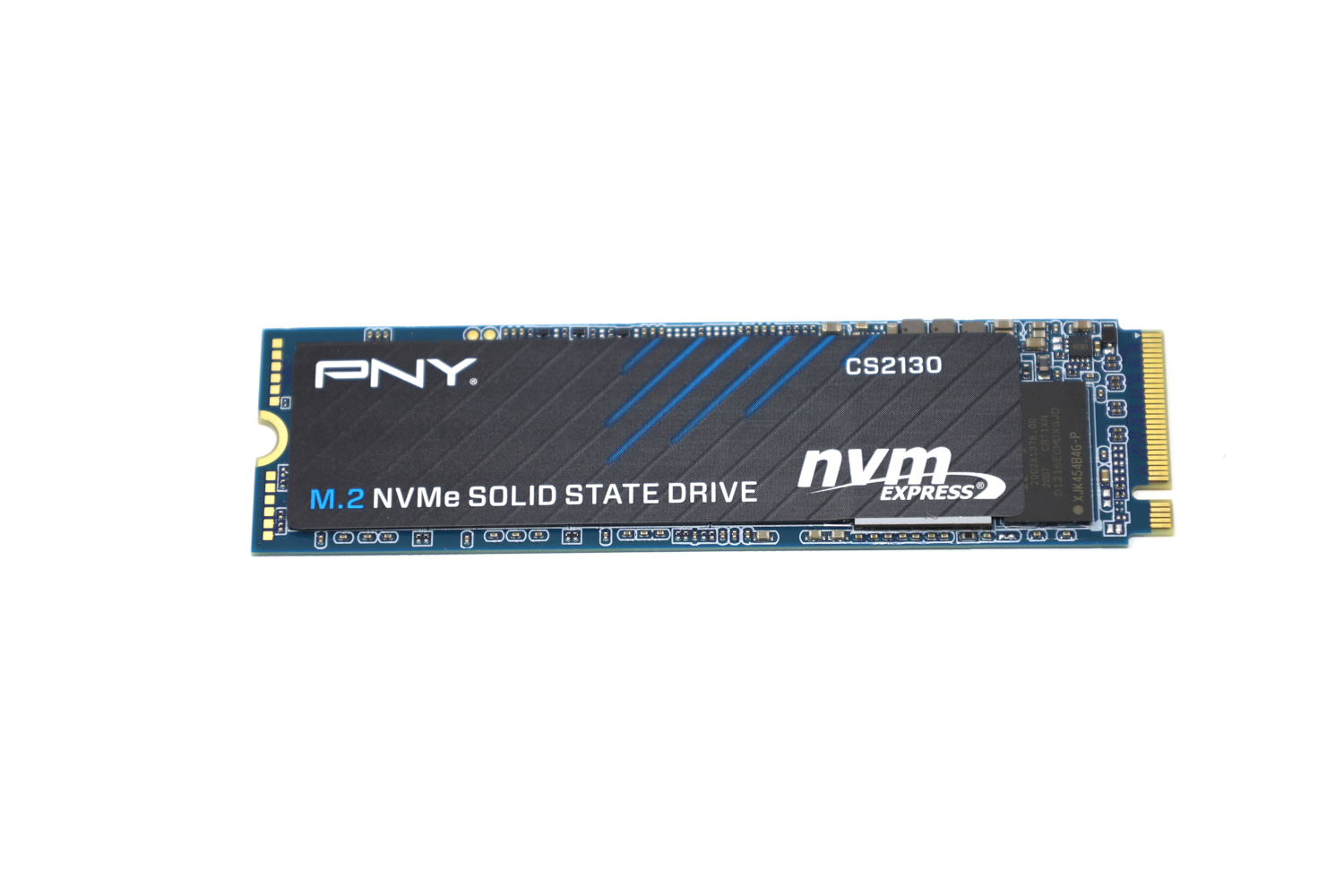
Beneath the product label is the Phison PS5012-E12S-32 controller, a single NAND package, and not much else. The E12S-32 controller is an 8-channel controller capable of handling either TLC or QLC, and on the CS2130 it is connected to Micron 64-layer QLC NAND. Also, onboard the front of the drive is a single DDR3 DRAM cache.
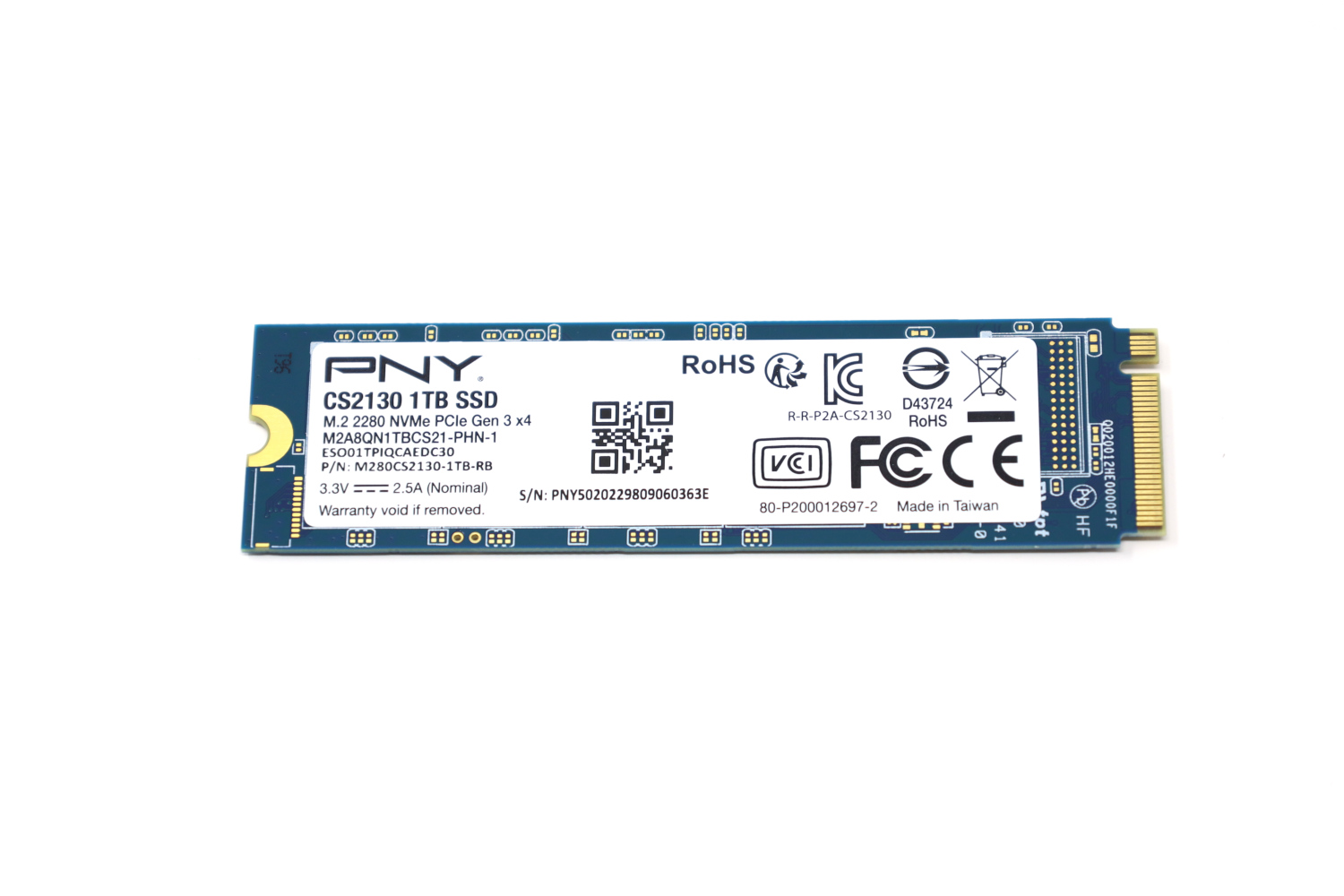
Since this is a single-sided drive, the back has nothing but a product label.
PNY CS2130 Specs
The PNY CS2130 line of SSDs is available from 500GB to 8TB.
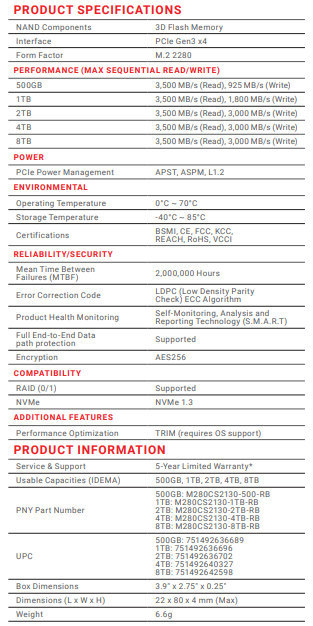
The 1TB drive we are looking at is near the bottom of the product stack, and as a result, while the sequential read performance is rated at a high (for PCIe 3.0) speed of 3500 MB/s, write performance is only rated at 1800 MB/s.
One major gripe I have with the entire PNY CS2130 line of drives is a lack of transparency from PNY with regards to the specs on the drive. Nowhere in any documentation that I could find is it disclosed the actual type of NAND, which turned out to be Micron QLC. Plenty of drives at or around the same price point as the CS2130 are TLC drives, and given the rated performance users might make an incorrect assumption that TLC is in use.
Also not disclosed is the rated endurance; you will notice that on the spec sheet the only rated endurance number is the MTBF. PNY happily provided endurance information for the CS3040 we previously reviewed, so we know they can provide this information when it suits them. Upon inspection of the product sheets for a number of their other SSD products, it seems that PNY commonly omits the write endurance spec for their drives. I took the step of reaching out to PNY’s support to inquire as to the rated endurance, and they were unable to provide me with a number, saying only that the warranty was for five years. Perhaps this means PNY is prepared to warrant their drives for unlimited writes in a five-year period? Inquiring minds want to know. Either way, no NAND lasts forever and so not providing some idea of the expected lifetime endurance is still a mark against this drive in my book.
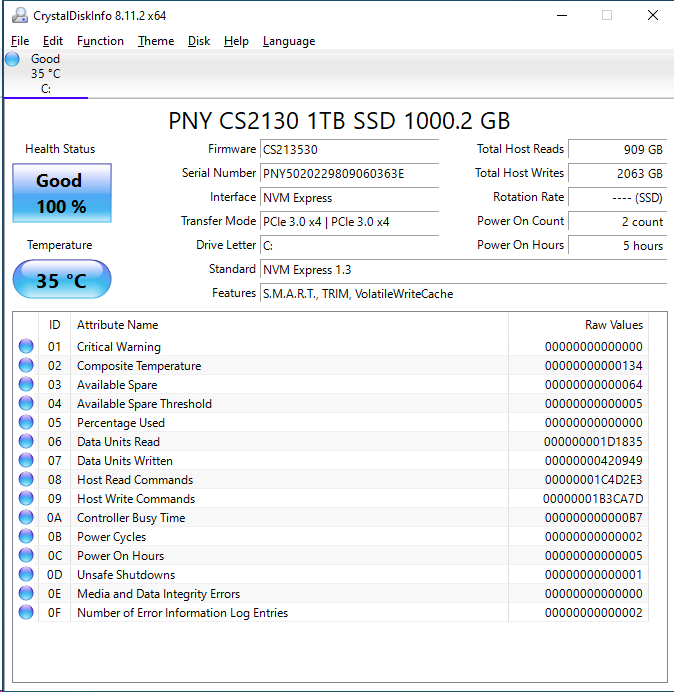
CrystalDiskInfo can give us some basic information about the SSD, and confirms we are operating at PCIe 3.0 x4 speeds using NVMe 1.3.
Test System Configuration
We are using the following configuration for this test:
- Motherboard: ASUS PRIME X570-P
- CPU: AMD Ryzen 9 3900X (12C/24T)
- RAM: 2x 16GB DDR4-3200 UDIMMs
Our testing uses the PNY CS2130 1TB as the boot drive for the system, installed in the M.2_1 slot on the motherboard. The drive is filled to 85% capacity with data and then some is deleted, leaving around 60% used space on the volume.
Next, we are going to get into our performance testing.

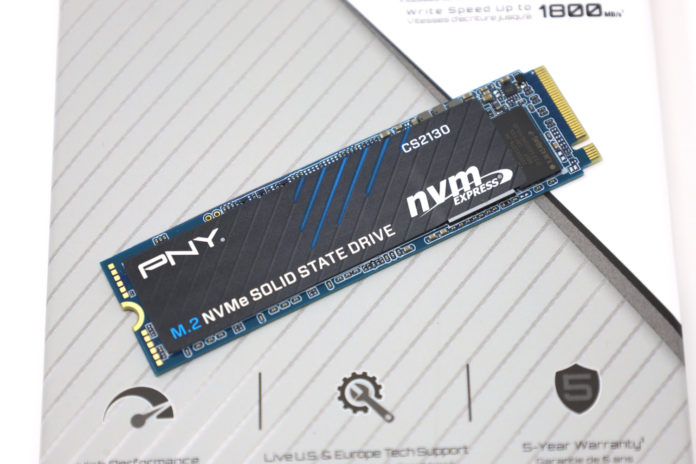
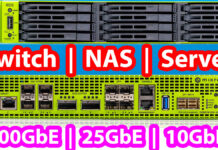
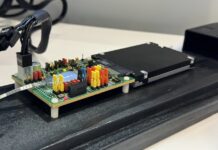
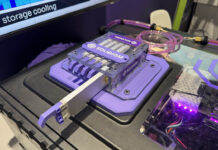
Hey Will, thanks for listening to my feedback and testing the post-pseudo-SLC-cache performance! The results of this (and other QLC drives) compared to the synthetic, low-volume benchmarks show why this is so important. Just abysmal compared even to low-tier TLC-NAND. Not to say it does not apply to most TLC NAND SSDs too, as they nearly all rely on pseudo-SLC cache now.
Cheers!
“SPECworstation benchmark”? I assume this drive is best for “worstations”.
We live in good times, for examples of bad components to be this rare.
The suspicious elements of my mind wonder if the occasional dud isn’t a sucker punch intended for grabbing the fattest margin possible from complacency?
well, to be fair to it, 100MB/s write post-cache is still way better than samsung 860 qvo which is 70-80mb/s. yet, the random write speeds are just unacceptable. if it wasn’t for that part, it would have been a good deal.
Thanks for the review.. was looking at the 2TB version due to its low price, for secondary/game storage that wouldn’t require too much write .. but dam these numbers are so bad i’ll be skipping that.
I’s simply effect of buffered writes. Between tests there is no time to flush buffers and then performance drops.
I have this 1TB drive in my PC as the system drive. Normally would not buy anything like this but because of the current GPU situation I had to buy a pre-built PC and this was in it. For general use it’s good, but when I am downloading a 50+ GB game on Steam via my 1Gbps internet connection, the drive just turns to poop. Constantly at 99% load, write speeds around the 100MB/s mark and the whole system gets unusable as Windows is not even able to load apps off of that drive. Currently considering upgrading the drive to a 970 EVO.
I found the TBW (Terrabytes written) warranty statement in an addendum to PNY’s SSD warranty PDF. The TBW warranty limits for the CS2130 are (drive capacity, warranty TBW): 500GB 110, 1TB 225, 2TB 450, 4TB 900, 8TB 1,810.
These numbers are in the “middling” TBW warranty numbers I’ve seen.
It’s too bad there hasn’t been a firmware update for these drives that fixes the abysmal write issues…. I know this because I checked using PNY’s “PCIe SSD Toolbox 2.0”.
I wish I had seen this review before I had bought the drive. Since I use it as my OS and program drive, and keep my downloads, documents, and media on an HGST 7200RPM datacenter drive and on my NAS, it still seems pretty zippy due to it’s decent read speeds.
I also keep the Windows pagefile on the HGST, as I don’t want to be doing constant writes to the Nvme SSD due to Window’s paging. By running my workstation with 64GB of Ram, the paging is kept to a minimum anyway….